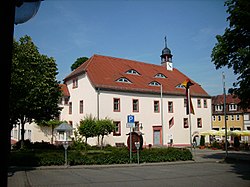Bad Sulza
Bad Sulza | |
|---|---|
 Town hall | |
 Coat of arms | |
show Location of Bad Sulza within Weimarer Land district | |
 Bad Sulza | |
| Coordinates: 51°5′15″N 11°37′20″E / 51.08750°N 11.62222°ECoordinates: 51°5′15″N 11°37′20″E / 51.08750°N 11.62222°E | |
| Country | Germany |
| State | Thuringia |
| District | Weimarer Land |
| Government | |
| • Mayor (2018–24) | Dirk Schütze[1] |
| Area | |
| • Total | 91.14 km2 (35.19 sq mi) |
| Elevation | 140 m (460 ft) |
| Population (2020-12-31)[2] | |
| • Total | 7,678 |
| • Density | 84/km2 (220/sq mi) |
| Time zone | UTC+01:00 (CET) |
| • Summer (DST) | UTC+02:00 (CEST) |
| Postal codes | 99518, 99510 (Flurstedt, Gebstedt, Wickerstedt) |
| Dialling codes | 036461 |
| Vehicle registration | AP, APD |
| Website | www.bad-sulza.de |
Bad Sulza is a town in the Weimarer Land district, in Thuringia, Germany. It is situated on the river Ilm, 15 km southwest of Naumburg, and 18 km north of Jena. The former municipality Ködderitzsch was merged into Bad Sulza in January 2019, and Saaleplatte in December 2019.
History[]
Within the German Empire (1871-1918), Bad Sulza was part of the Grand Duchy of Saxe-Weimar-Eisenach.
Notable citizens[]
- Johann Agricola (1590-1668), superintendent of the salt plant from 1622 to 1631, used the healing power of Sulza brine for therapeutic purposes.
- Adolf Piltz (1855-1940), German mathematician notable for his work in number theory.
Associated with the city[]
- Thomas Naogeorgus (actually Kirchmair) (1508-1563), theologian, Neo-Latin poet and playwright
Links[]
![]() Media related to Bad Sulza at Wikimedia Commons
Media related to Bad Sulza at Wikimedia Commons
References[]
- ^ Gewählte Bürgermeister - aktuelle Landesübersicht, Freistaat Thüringen, accessed 14 July 2021.
- ^ "Bevölkerung der Gemeinden, erfüllenden Gemeinden und Verwaltungsgemeinschaften in Thüringen Gebietsstand: 31.12.2020". Thüringer Landesamt für Statistik (in German). June 2021.
Categories:
- Towns in Thuringia
- Weimarer Land
- Grand Duchy of Saxe-Weimar-Eisenach
- Bezirk Erfurt
- Spa towns in Germany
- Weimarer Land geography stubs


